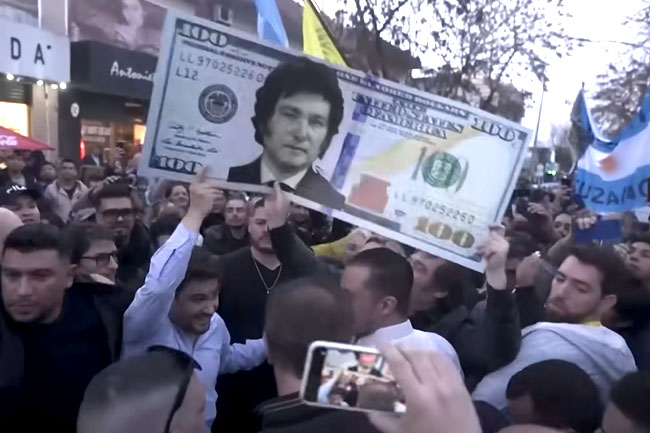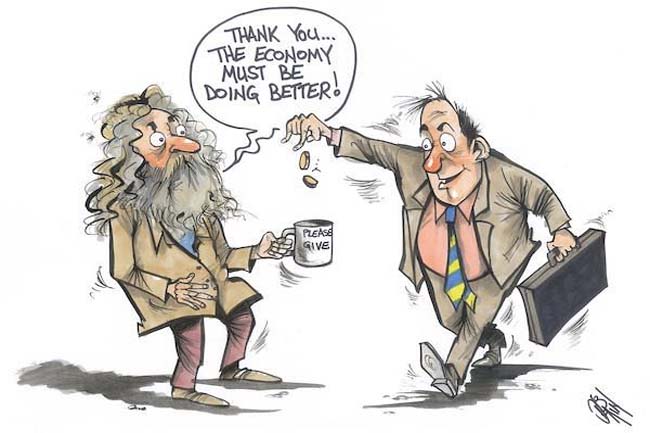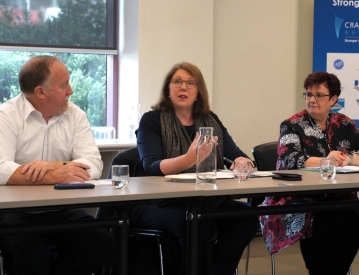Putin is now the Russian President and it is clear that the Cold War has been reborn, due largely to the West's Chicago-school "economic reform", writes Dr Steven Hail.
WHAT DAYS OF HOPE and expectation they were — the late 1980s.
Soon after coming to power in 1985, as a new broom after the old generation of communists had finally left the stage, Mikhail Gorbachev committed the Soviet Union to a new future.
A future of democratisation and reform. There was to be glasnost (freedom) and perestroika (openness). Though the language was that of socialism, there was the dream of a transition to something like a Nordic-style mixed economy, where the state retained a significant role. Inequality was to be limited but the market would gradually be given a role and people would be given the personal freedoms they had craved for so long.
Who can forget the meetings with Margaret Thatcher and Ronald Reagan? Thatcher liked Gorbachev and said, "We can do business together". Reagan urged Gorbachev to "tear down" the Berlin Wall and in 1989, the fall of that Wall is exactly what Gorbachev allowed to happen.
Surely, this was the end of the Cold War? Francis Fukuyama, then an official in the U.S. State Department, famously talked of "the end of history", as though the West had finally and forever won a battle of conflicting civilisations. From now on, there would be only one way. The world would be boring. The world would be capitalist. The world would be neoliberal.
So how did we get to where we are now? Back to the old days of assassinations and attempted assassinations; of the U.S. and the Russians fighting proxy wars, of increases in military spending and the fear of nuclear conflict, of accusation and counter-accusation — so you don’t know who to trust, or rather you know not to trust anyone, but you are never sure what the truth is.
Where did all the goodwill go? How could this happen?
The story was well told ten years ago, in chapters 11 and 12 of Naomi Klein’s brilliant The Shock Doctrine. (If you have never read that book, I recommend you place it on your reading list.)
We let Mikhail Gorbachev down. We killed glasnost and perestroika. We destroyed the emerging democracy and political freedom that was springing to life in the Soviet Union and which then clung to life in the new Russian state. We created the conditions which allowed Vladimir Putin to take power. We made Putin popular enough with the Russian people so that he probably did not need to rig the recent election to stay in power. We are the reason "history did not end", as far as the Cold War is concerned. We re-built the Cold War. Not you and I but Chicago-school economics, those who benefited from and funded its take-over of Western politics and the politicians who acted as tools of the Chicago school.
In July 1991, Mikhail Gorbachev, the winner of the 1990 Nobel Peace Prize, attended the meeting of the G7 Heads of Government in London with a plea for a helping hand in his mission of gradual transformation.
In his words:
“Like mountain climbers of a rope, the world’s nations can either climb together to the summit or fall together into the abyss.”
He was looking for some help to reach that summit.
His fellow heads of government, including the first George Bush and John Major, refused to help. He needed some aid and some debt relief and some patience. None was forthcoming. Chicago-school economists believe in shock therapy and Gorbachev was told to reform, privatise, liberalise and cut dramatically — in a way which would have required the kind of repression reminiscent of earlier generations of Soviet leaders. He was hung out to dry. He was set up to fail.
And he did fail. At his weakest point, he faced a push-back from communists, which provided an opportunity for Boris Yeltsin to rise to prominence – and for a while the status of a national hero – as the Premier of Russia and before long, led to Yeltsin announcing the dissolution of the Soviet Union and the re-birth of a Russian state.
Yeltsin was prepared to follow instructions and having persuaded the Russian Parliament at the end of 1991 to give him extraordinary powers, put a mix of Russian and American Chicago-school economists in charge of economic reform and let them run riot.
Price controls were to be scrapped, financial markets were to be set up, government was to be cut back and most of all, the thousands of state-owned enterprises were to be privatised very quickly — when the country was still in shock and without giving ordinary Russians any opportunity to stop the gutting of the Russian state, and the stripping of its assets.
The privatisations could have involved giving the businesses to their employees, or to the people generally, or they could have been sold for the highest prices, but this is not what happened. Instead, a small group of people in the elite – backers of Yeltsin and former communists, in most cases – were given businesses worth, in some cases, billions of dollars. The government actually lent money to these new oligarchs to allow them to "buy" government-owned assets for virtually nothing. Thus was a billionaire class formed in Russia, which Western multi-nationals then profited from immensely — by providing them with financial and other services, or buying shares in these newly privatised businesses.
All for the promise of a few billion dollars of aid from the West, which once Yeltsin had taken the Chicago path, the West saw fit to withhold in any case.
Russia’s economy crashed. Russia’s elected Parliament rebelled against Yeltsin’s dictatorial and corrupt rule. Yeltsin eventually used the military to attack the Russian Parliament. Russian democracy died, along with hundreds of ordinary Russians who tried to defend it. The West, Western politicians and the Western media sided with Yeltsin.
The Russian poverty rate increased many-fold in the mid-1990s, with desperate poverty returning to the country for the first time in years and most people feeling they had been better off under Brezhnev than with this new freedom. Yeltsin was under threat. To stay in power, he started a disastrous rule against the small republic of Chechnya. It was this disaster which allowed Vladimir Putin to build a reputation as a tough-man Prime Minister, under President Yeltsin — and the obvious man to take-over the presidency when Yeltsin’s health and alcoholism overcame him, at the end of 1999.
Putin then got lucky. There was a commodity price boom in the early 2000s, which allowed the Russian economy to grow, based on oil and gas exports. People’s living standards started to increase and Putin got much of the credit. This hard man was restoring Russia’s pride and independence. Russians had little to thank the Western neoliberals for. They had betrayed Gorbachev and betrayed Russia. Putin came to an understanding with most of the oligarchs – who had looted the Russian state – and placed representatives from his security service in positions of influence on many boards of directors. He crushed those who opposed him. Russians were prepared to let him do this. They had suffered much. As their remaining democracy and political freedoms were gradually removed again, in a transition to a totalitarian state once more, this seemed to many Russians a price worth paying — for their national pride and for bread on the table.
By the late 2000s, Russia was strong enough again to defy the West, to cope with Western economic sanctions and to start offering non-aligned states an alternative ally to the USA. We were not quite back to the old days of Brezhnev and Nixon, or Kennedy and Khrushchev, but we were well on the way there.
And what of 2018? Vladimir Putin is President, so it seems, for as long as he cares to be President. Whether you have a purely negative, positive or nuanced view of the man and however you feel about his counterparts in the West, or in China and India, or elsewhere in the world, it is clear that the Cold War has been reborn.
The West – and the mistaken and misleading approach to economic reform advocated by what has become known as the Chicago-school – must take a large share of the blame.
We let down Gorbachev. We let down Russia. We created Putin. Put it down to Milton Friedman, Friedrich Hayek and those who draw inspiration from them.
You can read more by Dr Steven Hail at erablogdotcom or follow him on Twitter @StevenHailAus, as well as on Facebook at Green Modern Monetary Theory and Practice.
 This work is licensed under a Creative Commons Attribution-NonCommercial-NoDerivs 3.0 Australia License
This work is licensed under a Creative Commons Attribution-NonCommercial-NoDerivs 3.0 Australia License
Support independent journalism Subscribe to IA.












